Recent Books by Faculty
Medicating Race: Heart Disease and Durable Preoccupations (Duke University Press, 2013) by Anne Pollock, assistant professor in the School of History, Technology, and Society, traces the intersecting discourses of race, pharmaceuticals, and heart disease in the United States over the past century.
The Sons of Westwood: John Wooden, UCLA, and the Dynasty That Changed College Basketball (University of Illinois Press, 2013) by John Mathew Smith, assistant professor in the School of History, Technology, and Society, weaves together a story of sports and politics in an era of social and cultural upheaval.
What Does Georgia Tech Think?
Selected Press for Ivan Allen College of Liberal Arts
|
Smith on UCLA's John Wooden
“Most of the books written about or by Wooden fall into the category of hagiography without placing him in any kind of historical context,” said John Mathew Smith, an assistant professor in the School of History, Technology and Society, on his recently published book, The Sons of Westwood. “I tried to set my work apart from other books on Wooden and college basketball’s history by placing it in the context of the social, cultural, and political changes of the 1960s and 1970s. Source: Los Angeles Daily News, October 31, 2013
Bogost on Flipped Classrooms
“There is reason to believe that continued investment in even the local, non-scaled, modest version of flipped classrooms will at the end of the day benefit these MOOC-like solutions because they will provide evidence and fodder and materials in general,” said Ian Bogost. Bogost, a professor in the School of Literature, Media, and Communication describes himself as cautious regarding flipped classrooms, but goes on to say that the model is only one of many factors in the larger debate about technology-based educational reform. Source: The Inside Higher Ed, October 30, 2013
Kosal on Bioterrorism
“Most of those discussions are grounded or based in assessment of technical or physiological characteristics of the pathogen rather than technical requirements to make an effective weapon and broader consideration of motivation," said Margaret E. Kosal about whether government lists of potential bioterrorism agents are based on pathogen deadliness rather than actual risk. Kosal is an assistant professor in The Sam Nunn School of International Affairs. Source: Healthline News, October 26, 2013
Meek on Recovery from the Recession
“At some point, I think they are going to figure this out. The question is how long the Fed is willing to do this,” said Alphie Meek on the "quantitative easing" caused by the Federal Reserve buying federal debt at little to no interest. He predicted this cycle will be difficult to break, with interest payments equaling the entire revenue from income taxes each year. Meek is an alumnus of the School of Economics and team director within Georgia Tech’s Enterprise Innovation Institute. Source: Gwinnett Daily Post, October 24, 2013
Ross on the Government Shutdown
Cutting off access to federal data "stops knowledge flow and creativity—a big disadvantage to those studying past trends and predicting future ones," said Glo Ross, a graduate research assistant and doctoral candidate in the School of History, Technology, and Society, on the inability to access census data and archival materials during the shutdown. Source: CNN, October 18, 2013
Boston on Hitting the Debt Ceiling
"It will happen incrementally, not all at once. We will see it unfolding over several months. Think of it as a fiscal stimulus in reverse." said Thomas "Danny" Boston on how a default crisis would play out. “There will be layoffs, cuts in spending, spiking interest rates that will stop homebuying and auto purchases. There will be losses in confidence and cutbacks in corporate investment.” Boston is a professor in The Sam Nunn School of International Affairs. Source: The Atlanta Journal Constitution, October 13, 2013
November 21, 2013
12:05 pm
November 21, 2013
4:30 pm
November 21, 2013
5:30 pm
November 21, 2013
8:00 pm
November 22, 2013
2:00 pm
November 22, 2013
8:00 pm
February 13, 2014 - May 17, 2014
10:00 am
February 13, 2014 - May 17, 2014
6:00 pm
|
Ivan Allen College Ranks 5th Highest in Salaries for New Humanities and Social Sciences Graduates according to NerdWallet
|
|
New graduates from the Georgia Tech Ivan Allen College of Liberal Arts earn the fifth highest starting salaries among those with degrees in Humanities and Social Sciences according to a new report released November 5 by NerdWallet. “Georgia Tech grads rake in top salaries for many majors and liberal arts is no exception. The average salary for Ivan Allen graduates is $47,950, although the most recent numbers from 2013 show this year’s graduates are making an average of $55,300,” noted the report. Despite the reputation of liberal arts “for providing students with limited career choices in low-paying jobs, some schools have helped their recent graduates take home salaries well above the humanities and social science average,” the report stated. “The college’s six schools combine to offer a robust intellectual environment and an ambitious array of disciplinary and interdisciplinary learning experiences for students. Graduates are distinguished by their ability to address complex problems by bridging technological and non-technological realms.” Georgia Tech Ivan Allen College was the only public institution among the Top 10 list which included schools such as Carnegie Mellon, the University of Pennsylvania, and Cornell. “As the only true public school on the list, Georgia Tech is an affordable option with a high return on investment.” The NerdWallet ranking was based on self-reported salaries for new graduates averaged from 2010-2013. The report stated that average salaries for humanities and social sciences grads ranges from $37,000 to $41,000 depending on the major, according to the National Association of Colleges and Employers (NACE). |

|
Building the Future Power Grid: IAC Faculty Tackle Energy Challenges
On a warm afternoon in August 2003, untrimmed trees in rural Ohio sagged into high-voltage power lines, triggering a cascade of power failures throughout eight northeastern states and southeastern Canada. Ultimately, 50 million homes lost power. It was the biggest blackout in North American history and, for many, it was a wake-up call signaling the fragility of our electric energy grid.
Almost 10 years later, our electric power system continues to be challenged, by increasing demands of a digital society, the need to accommodate renewable energy generation, growing threats to infrastructure security and concerns over global climate change. The technology for a smart grid—with a two-way flow of electricity and information between utilities and consumers—could help address these challenges, but technical, regulatory, and financial obstacles have slowed its deployment.
Faculty in the Ivan Allen College of Liberal Arts, together with other researchers at Georgia Tech, are helping advance the smart grid.
Analyzing State, National and International Energy Policies
In recent years, a number of U.S. states, the federal government and other countries have adopted or are considering energy-related laws, regulations, programs, and voluntary or mandatory requirements aimed at improving and enhancing power systems. This includes programs that promote renewable energy development or energy efficiency, policies that support development and deployment of smart grid technologies, and laws mandating renewable portfolio standards. Researchers in the Ivan Allen College schools of Economics, Public Policy, and The Sam Nunn School of International Affairs have analyzed these policies and uncovered their similarities and differences.
Japan was resistant to adopting smart grid technologies for years. Because 10 regional utilities held a monopoly on the power supply, there was little discussion of the smart grid. Then came Fukushima in March 2011. Following a major earthquake, a tsunami disabled the power supply and cooling of three Fukushima Daiichi reactors, causing a nuclear accident. Because only two of Japan’s 50 nuclear reactors are currently operating, the country must now rely more heavily on renewable energy sources—and that requires a smart grid.
Brian Woodall, an associate professor in The Sam Nunn School of International Affairs (INTA), has studied energy policy in Japan dating back to the 1950s. Now, he’s analyzing Japanese energy strategy and the policies that will foster the development of a smart grid and the effective and sustained use of renewable energy in Japan. Collaborating with Woodall on this work are INTA Associate Professor Adam Stulberg, Associate Professor Mark Zachary Taylor, Senior Research Associate William Foster, and graduate student Liz Dallas; School of Mechanical Engineering Professor Glenn Sjoden; and School of Public Policy and School of Industrial and Systems Engineering Associate Professor Valerie Thomas.
In the 1980s and 90s, Japan’s “Rooftop Program,” which subsidized consumers who put solar panels on their homes, became the world’s first large-scale developmen t of photovoltaic technology and demonstrated its feasibility as an energy source. Today, the government is encouraging the creation of large-scale solar farms and geothermal energy. In 2012, the Japanese government lifted its decades-old ban to allow geothermal projects in national parks and monuments and earmarked $67 million for a program to aid geothermal power developers through capital injections and debt guarantees. By 2030, the Japanese government aims to triple renewable energy sources, which today make up about 10 percent of the country’s power supply. t of photovoltaic technology and demonstrated its feasibility as an energy source. Today, the government is encouraging the creation of large-scale solar farms and geothermal energy. In 2012, the Japanese government lifted its decades-old ban to allow geothermal projects in national parks and monuments and earmarked $67 million for a program to aid geothermal power developers through capital injections and debt guarantees. By 2030, the Japanese government aims to triple renewable energy sources, which today make up about 10 percent of the country’s power supply.
“To achieve this goal, the government will likely need to increase its support for the introduction of new renewable technologies through tax reductions, subsidies, and support for research and development,” said Woodall. “Japan may also need to create new energy policies that promote the development of smart cities and the installation of smart meters and other energy management systems.”
Professor Marilyn Brown recently analyzed smart grid policies in several countries and found that government is still the key player in smart grid investments. (Click image to download high-resolution version. Credit: Gary Meek)
School of Public Policy Professor Marilyn Brown and graduate student Shan Zhou recently analyzed smart grid policies in Great Britain, Italy, China, Japan, South Korea and the United States. In a study published in the March/April 2013 issue of the journal Wiley Interdisciplinary Reviews: Energy and Environment, they found that governments have overcome various financial, regulatory and technical barriers to facilitate grid modernization.
“Currently, government is still the key player in smart grid investments. Our research suggests the need for a policy framework that attracts private capital investment, especially from renewable project developers and communication and information technology companies,” said Brown.
The study also revealed growing worldwide consensus that smart meters are an essential enabler of grid modernization. A smart meter can measure real-time electricity consumption and communicate the information to the utility and the consumer. Britain, Italy and South Korea expect full adoption of smart meters by 2020. In the United States, many utilities used Smart Grid Investment Grants (with a total public investment of about $4 billion) to pay up to 50 percent of costs to install advanced metering infrastructures.
South Korea’s Smart Grid Road Map 2030 plans to spend $25 billion to facilitate the development and construction of smart grid technologies for the power grid, vehicles, and renewables. In contrast, China’s 2012 plan for its smart grid emphasizes power generation and transmission, reflecting its relatively underdeveloped power distribution system and the challenge the Chinese electricity market faces in developing effective interaction mechanisms between customers and utility companies.
Feed-in tariffs, which pay a premium to small-scale renewable electricity producers for the purchase of their renewable energy, are popular worldwide for encouraging renewable electricity generation. Britain introduced feed-in tariffs for small low-carbon electricity generation facilities through its 2008 Energy Act. Japan, China and Italy have feed-in tariffs to develop domestic markets for solar power. A few utilities in the United States also offer feed-in tariffs for solar power purchases.
 Although smart grid policies vary across the United States, Brown and Zhou found that most states have implemented interconnection standards and net metering policies, although constraining limits also exist in some states. Net metering allows customers to connect the power they generate to utility grids to offset their electricity consumption and sell excess generation to the utility. Although smart grid policies vary across the United States, Brown and Zhou found that most states have implemented interconnection standards and net metering policies, although constraining limits also exist in some states. Net metering allows customers to connect the power they generate to utility grids to offset their electricity consumption and sell excess generation to the utility.
Dynamic pricing programs, which provide real-time prices to customers and let them decide when to consume electricity based on cost, are also widely used in industrial and commercial sectors of the United States, but are just beginning to become available to residential customers.
Daniel Matisoff, an assistant professor in the School of Public Policy, is examining the factors that drive states to adopt policies promoting renewable energy development or energy efficiency. Because the vast majority of literature suggests that states either learn from each other or compete with each other, Matisoff and graduate student Jason Edwards are currently investigating two competing theories about what drives renewable energy policy adoption at the state level: the internal characteristics of the state or the fact that other states have already adopted the policy. The researchers are assessing three highly competitive policies aimed at economic development and five low-competition policies.
“Our preliminary findings show that states do not tailor their policies to match their geographic characteristics,” said Matisoff. “More than anything else, renewable energy policy and energy development appear to be outcomes of a political market.”
States with larger numbers of carbon intensive industries are less likely to adopt renewable energy programs, while states with more liberal populations and stronger environmental interest groups are more likely to adopt programs. In addition, states with more liberal populations, higher levels of air pollutants, more renewable potential and a less carbon dioxide-intensive industry make more attempts to adopt renewable energy policies.
Renewable portfolio standards have become a popular tool for state governments to promote renewable electricity generation and to decrease carbon dioxide emissions. A renewable  portfolio standard is a mandate that retail electricity providers purchase a specified fraction of their electricity sales from renewable sources. By March 2013, 29 states, the District of Columbia, Puerto Rico, and the Northern Mariana Islands had passed mandatory renewable portfolio standards; and eight states, Guam, and the U.S. Virgin Islands had passed voluntary renewable portfolio standards. portfolio standard is a mandate that retail electricity providers purchase a specified fraction of their electricity sales from renewable sources. By March 2013, 29 states, the District of Columbia, Puerto Rico, and the Northern Mariana Islands had passed mandatory renewable portfolio standards; and eight states, Guam, and the U.S. Virgin Islands had passed voluntary renewable portfolio standards.
Erik Johnson, an assistant professor in the School of Economics, is estimating the long-run price elasticity of supply of renewable electricity generation. This is a measure of the responsiveness of the quantity of renewables supplied to a change in its price. It gives the percentage change in quantity demanded in response to a one percent change in price. The price elasticity is an important parameter for policymakers to determine the cost of carbon abatement from these policies relative to other methods of reducing carbon dioxide emissions.
Johnson’s preliminary findings suggest that renewable portfolio standards are an expensive way to decrease carbon dioxide emissions, costing more than six times more than a cap-and-trade program to reduce carbon dioxide emissions by 2.5 percent. In a cap-and-trade program, emissions allowances are allotted to polluters, and companies whose emissions exceed their allocations must either obtain extra allowances or buy credits from projects that cut greenhouse gas emissions.
Georgia Tech supports multidisciplinary research teams that are developing technologies and methodologies to improve the efficiency, performance and reliability of the power system. Researchers are also analyzing the policies that will promote the path toward creating the next generation of the electric utility grid. Together, they are all contributing to finding ways to keep the lights on.
This article is an excerpt from Georgia Tech Research Horizons Building the Future Power Grid: Researchers Tackle Energy Challenges with Technology Development and Policy Analysis published October 23, 2013.
The research described in this article has been supported by the National Science Foundation (NSF) and by the Department of Energy (DOE). The conclusions and recommendations contained in the article are those of the authors and do not necessarily reflect the official positions of the NSF or DOE.
|
Clark Joins Inaugural Milstein Symposium on Manufacturing Jobs Chaired by Barbour and Bayh
Jennifer Clark, director of the Center for Urban Innovation (CUI), Ivan Allen College of Liberal Arts and associate professor in the School of Public Policy, has been named to a new commission at the University of Virginia Miller Center that is focusing on job creation for small and medium-sized manufacturers. Part of the Center’s Millstein Symposium, the commission is co-chaired by former Mississippi governor Haley Barbour and former Indiana governor and senator Evan Bayh.
The inaugural agenda will focus on renewing middle class jobs. Three commissions will examine topics in manufacturing, entrepreneurship and self-employment, and infrastructure investment.
Barbour said, “The public has understandably lost confidence in Washington’s ability to generate common-sense, bipartisan solutions to our nation’s challenges. This commission will bring together policymakers, scholars, industry leaders and other stakeholders to craft those solutions—the type of people that can achieve broad consensus and develop actionable ideas, not just more rhetoric.”
The commission is expected to release recommendations in February.
Other members of the commission on manufacturing include Rebecca O. Bagley, president and chief executive officer, NorTech; Aaron Bagshaw, president, WH Bagshaw Co., Matthew Burnett, founder, Maker’s Row, W. Bernard Carlson, chair, University of Virginia Department of Engineering; John Engler, president, Business Roundtable; former governor of Michigan; James Fallows, national correspondent, The Atlantic; James Manyika, director, McKinsey Global Institute and senior partner, McKinsey & Company; Kate Sofis, executive director, SFMade; Howard Wial, director, Center for Urban Economic Development, University of Illinois, Chicago.
More information on the Milstein Symposium is available at http://millercenter.org/conferences/2013/milstein.
|
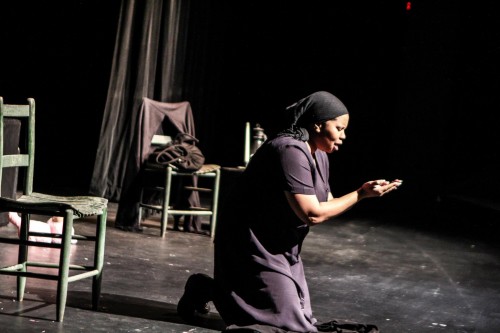
|
A Sparkling Array of Fall Activities Sets the Stage for Africa Atlanta 2014
Photo of actress Shontelle Thrash in the theatrical production of Mother to Mother.
Eight special events organized by the Ivan Allen College of Liberal Arts introduced audiences across Atlanta to the scope and depth of themes that will be explored during Africa Atlanta 2014. Activities spanned arts & culture, business & innovation, education, and global affairs.
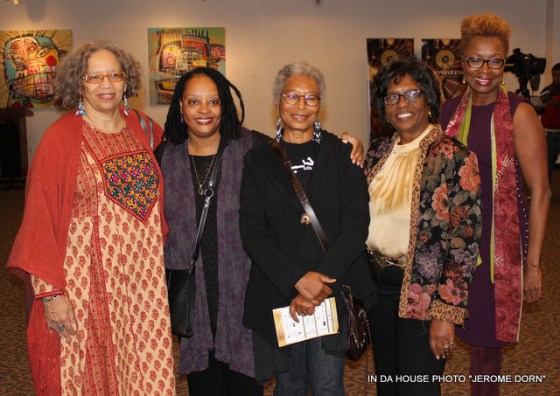
Above (L-R): Beverly Guy-Sheftall of Spelman College, author Valerie Boyd, Alice Walker, IAC Dean Jacqueline J. Royster, and Kathleen Bertrand of BronzeLens Film Festival
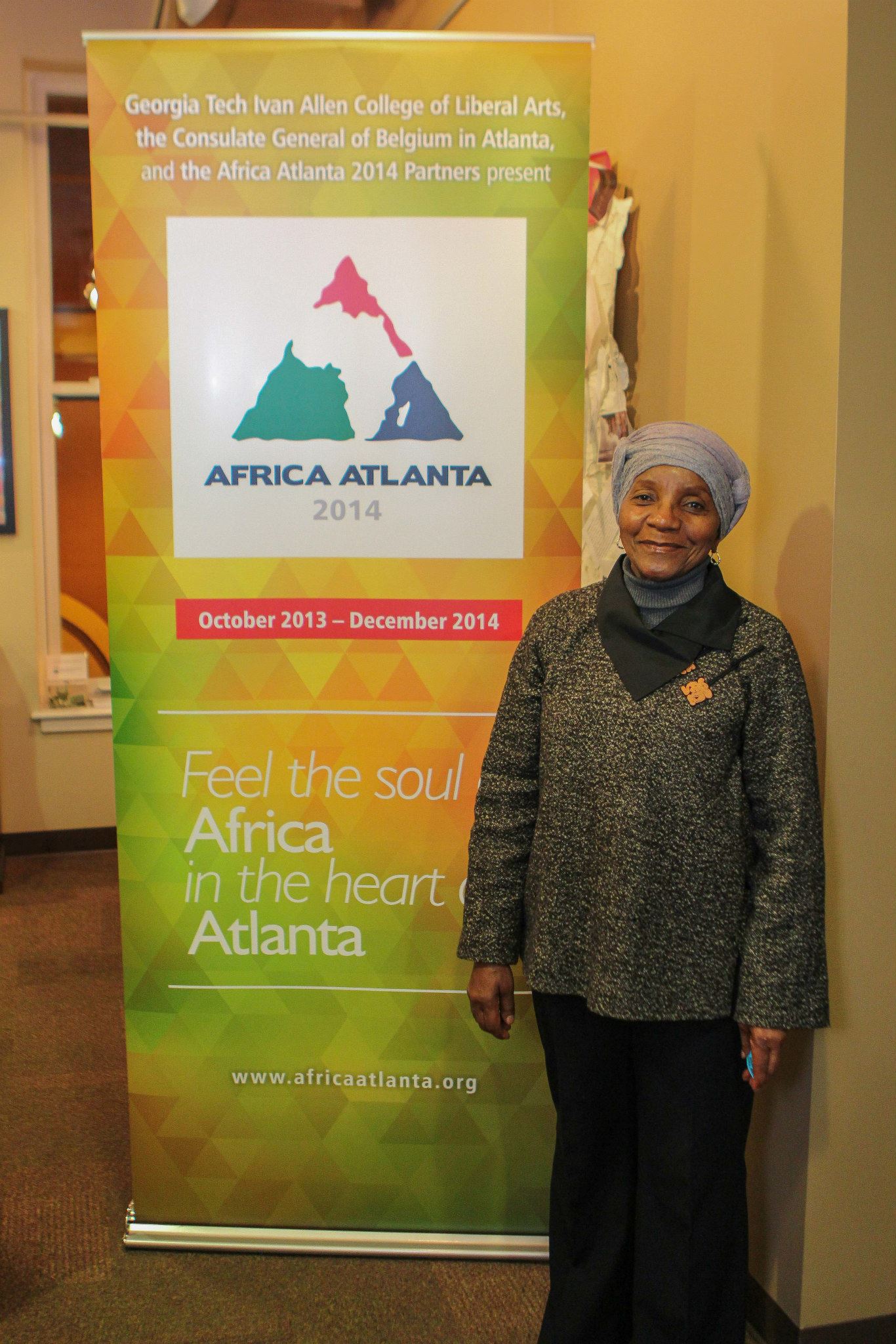
Photo at left: Author and playwright Sindiwe Magona
They included the Atlanta premiere of Alice Walker: Beauty in Truth, a penetrating film biography of the award-winning author (The Color Purple) and activist, and a conversation with Walker and the filmmaker; the theatrical production of Mother to Mother, an intensely moving, one-woman play by author Sindiwe Magona who discussed the work in a post- performance dialogue; film clip screenings and conversation with Chadian film maker Mahamat-Seleh Haroun (Bye By Africa, A Screaming Man); a dialogue with award-winning journalist and Civil Right icon Charlayne Hunter-Gault with tastings from her South African vineyard; a conversation with business and policy expert Haskell Ward about economic and cultural opportunities in Africa; and the Georgia Tech Africa Student Union’s Taste of Africa.
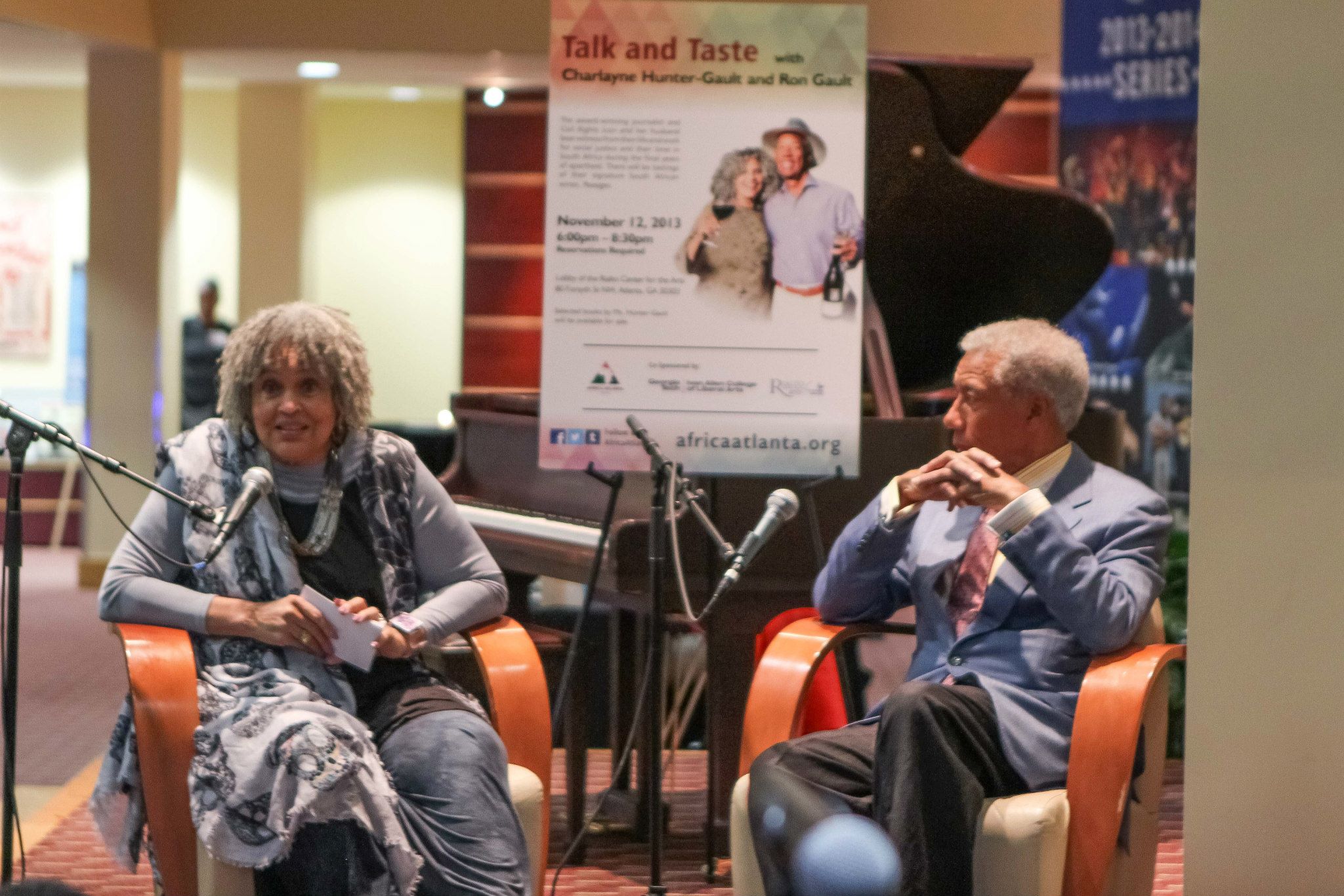

Photo at right: Journalist Charlayne Hunter-Gault (l) and Ron Gault.
Coming Up:
December 14, 2013—March 9, 2014—Romare Bearden: A Black Odyssey (Arts & Culture)—Michael C. Carlos Museum, Emory University. Rich in symbolism and allegorical content, Bearden's Odyssey series creates an artistic bridge between classical mythology and African American culture.
Grand Opening of Africa Atlanta 2014 and "Mapping Place: Africa Beyond Paper," February 13 (Arts & Culture)—Robert C. Williams Paper Museum, Georgia Tech. This exhibition explores how the changing representation and projection of space has shaped our approach to Africa. The exhibition also asks what we learn when we place African artifacts in the cultural space from which they come, rather than simply relocating them in the aestheticized space of museums. The exhibition runs through May 16.
Visit www.africaatlanta.org to learn more about this citywide year-long series of events highlighting Atlanta as a nexus for reinventing the cultural and economic bonds among Africa, Europe, and the Americas.
|
Sons of Westwood: Smith Book Views Legendary UCLA Wooden Dynasty through Cultural Upheaval of 1960s and 1970s
John Mathew Smith, an assistant professor in the School of History, Technology, and Society, was recently interviewed on NPR about his new book The Sons of Westwood: John Wooden, UCLA, and the Dynasty That Changed College Basketball. He appeared on the NPR series Only a Game hosted by veteran commentator Bill Littlefield.
What best explains the annual success of John Wooden’s teams recruiting, or teaching, or the coach’s charisma? What was going on there?
Well, I think it was a combination. I mean Wooden was an excellent coach, fantastic in practice at breaking down the fundamentals, developing team unity and cohesion on the court, but John Wooden we have to remember was at UCLA for 15 years before he won his first national championship, and you can’t win without great players.
So his early championship teams were very guard-oriented with Walt Hazzard and Gail Goodrich — two All-Americans — but then when Lew Alcindor arrived in his first varsity season, in 1966-1967, the offense ran through him. And then after those players left, Bill Walton came, and so [Wooden] changed again with a center. So his ability to adapt, really I think, is what sustained his success with the combination of these really incredibly talented players.
 John Wooden was celebrated not only as a fantastically successful coach, but as a fellow who stood for tradition and order. Was that a legitimate reading of John Wooden? John Wooden was celebrated not only as a fantastically successful coach, but as a fellow who stood for tradition and order. Was that a legitimate reading of John Wooden?
You know, John Wooden in the 1960s and the 1970s was a symbol of moral authority. This is an age when America’s college sons and daughters have turned a deaf ear to their parents, right? They’re questioning their parents. They’re questioning authority. They’re questioning professors and administrators on America’s campuses.
Wooden projects this image of consensus in a time of dissent, but ultimately his players did respect his authority, and he was able to bring them together in a way that they were successful when it was time to play.
Some of the most compelling stories in The Sons of Westwood involve John Wooden’s relationship with Bill Walton. Wooden did not like Walton’s social activism, which the coach regarded as certainly inappropriate perhaps even un-American. Walton did not like the coach’s rules involving things like hair length and beards. How did those two get along?
At their core, they were both competitors. They both loved basketball and I think that’s really what brought them together. And I think its part of the beauty — here they are, two very different guys. Here is John Wooden who has very different views of society and morals and politics. And then you have Bill Walton who is the son of liberals, grows up in San Diego, someone who was drawn to social-action movements. [In] the anti-war movement, he gets arrested in 1972 for occupying the administration building. Ultimately Walton respected Wooden as his coach. He challenged him, but there was a certain line that he didn’t cross, and I think that that was true of a lot of the players that did test Wooden on and off the court.
John Matthew (Johnny) Smith (Ph.D., Purdue University) came to HTS in fall 2012 as a postdoctoral fellow and was recently appointed assistant professor in Sports History. His book, The Sons of Westwood: John Wooden, UCLA, and the Dynasty That Changed College Basketball, was recently published in the University of Illinois Press series on Sport and Society. Smith has published three scholarly articles and is currently working on a biography of Muhammad Ali.
|
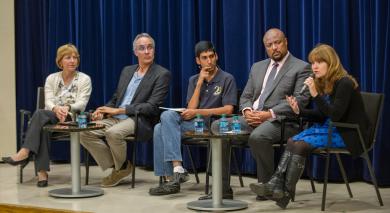
|
MOOC Instructors Share Lessons Learned
Two young Iranian women expressing how happy they were to find a strong female figure to look up to. A quadriplegic in Scotland sharing how, for the first time in his life, he felt equal to his classmates. These are just a few of the stories that Karen Head, assistant professor in the School of Literature, Media, and Communication, shared about her experience teaching a massive open online course (MOOC) during a MOOC-focused town hall on October 24.
“[In the case of the Iranian women] I feel like the anonymity of the MOOC allows students to speak up in a way that they can’t always do under other circumstances,” Head replied to a question regarding the challenge of getting students to participate and provide feedback with a MOOC format.
Head was one of five MOOC instructors who joined Provost Rafael Bras to discuss the progress of MOOCs at Georgia Tech and lessons learned.
The other panelists included Bonnie Ferri, professor and associate chair for undergraduate affairs in the School of Electrical and Computer Engineering; Mike Schatz, professor in the School of Physics; Charles Isbell, senior associate dean for academic affairs in the College of Computing; and Alex Duncan, a master’s student in Human-Computer Interaction, who served as a teaching assistant for the Introduction to Psychology as a Science MOOC.
To kick off the discussion, each panelist was invited to share a bit about their MOOC experiences.
“I was impressed with the [discussion] forums, because I loved how students would jump in and answer each other’s questions,” Ferri said.
Schatz shared that he doesn’t usually have a chance to get to know students in his introductory physics courses. Teaching the MOOC version allowed him to use class time for interactive activities that supplemented the online lectures and provided him a chance to develop relationships with his students.
Isbell, who is preparing to teach his first MOOC, commented that he always thought he did a good job of evaluating how he teaches his courses on a regular basis.
“I’ve realized that I wasn’t doing as good of a job as I thought,” Isbell said. “This has forced me to really think about my learning objectives and assessments.”
There was also an opportunity for members of the audience to ask questions. One person asked if MOOCs were going to completely replace on-campus classes.
“I don’t think this is the situation,” Bras said. “I certainly believe that undergraduate education, especially in an environment like Georgia Tech, will only benefit.”
Duncan added that people often think that MOOCs are in competition with face-to-face courses, but that the two formats can complement one another by providing opportunities for those off campus to learn and on-campus contingents to make better use of class time. View a recording of the town hall here.
|
Alumnus’s Photo App Gives Users Control of Social Footprint
Pressgram looks similar to other mobile apps that specialize in photo editing and sharing, but there is an important distinction—users publish pictures directly to their own websites using the app. John Saddington, creator of the app and an alumnus of the School of Literature, Media and Communication, is betting Pressgram will be a subtle but clear alternative for how people choose to share their photo creations.
Social media sites will still be a click away, but Pressgram—with filters and functionality that should be familiar to many users—gives content creators exclusive ownership of their photos. The free iOS app prompts its users to create a WordPress blog account, a simple process for those weaned on Facebook and Twitter. Pressgram photos can then be published on a blog with a tap of the screen, allowing owners to share pics without third parties profiting from the images.
“Your images can be stored on your own systems forever,” says Saddington. “This continuity of data is vitally important,” he continues, “as are the implications of sharing through social networks whose agenda is strictly monetization of user content.”
A self-proclaimed rebel while in the Georgia Tech College of Computing who “didn’t want to program the way the institution told me I should,” the alumnus eventually earned a Bachelor of Science in Science, Technology, and Culture (STaC) from the Ivan Allen College of Liberal Arts. Saddington started his path to Pressgram as a response to the current social media landscape. He was part of a small Facebook user exodus when the company acquired Instagram and made changes to the photo app’s terms of service that allowed user photos to show up in advertising content without compensating users.
“I hope people start leveraging their blogs more as the primary destination for all the activity surrounding them and their work and organization instead of giving control over to social networks that may not be around forever,” Saddington says. “[Pressgram] will create deeper and more intimate collaborative work too,” he says of his solution to photo-sharing in the digital age.
Saddington created Pressgram in six months, working on it as often as he could given commitments to his full-time job at the startup 8BIT, and family life. The app project was supported by a Kickstarter campaign that raised more than $56,000. Released on the App store this past summer, Saddington hopes Pressgram will lead to new user behaviors in social sharing and self-publishing.
“Pressgram quickly opens the door for busy people to document and share their work and allows others to encounter and engage with that work more directly and more often,” he says.
Filling the photo-sharing void started as a personal pursuit for Saddington. He adheres to a coder creed of sorts to “build the technology if it can’t be found.” Soon smartphone-toting photo enthusiasts everywhere may rejoice at the prospect of having their digital lives a little more secure, thanks to this programming rebel.
|
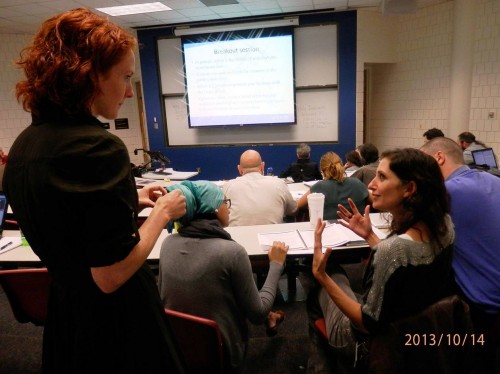
|
800 High School Students Attend Reinvigorated Georgia Tech Model United Nations
Over 800 high school students from across the country took their seats at the Ferst Center October 14 to participate in opening ceremonies for a revitalized Sixteenth Annual Georgia Tech Model United Nations (GTMUN) conference.
Sponsored by The Sam Nunn School of International Affairs (INTA), GTMUN promotes global awareness and citizenship and provides a forum for debate on global dilemmas.
The conference is entirely run by Georgia Tech undergraduate students, who serve as the Secretariat for the Model United Nations program by organizing and leading the event. The GTMUN XVI Secretariat revolutionized the conference to realize a vision to “inspire high school students today to build a better tomorrow” — a vision that the more than 800 high school students who attended got to see put into action.
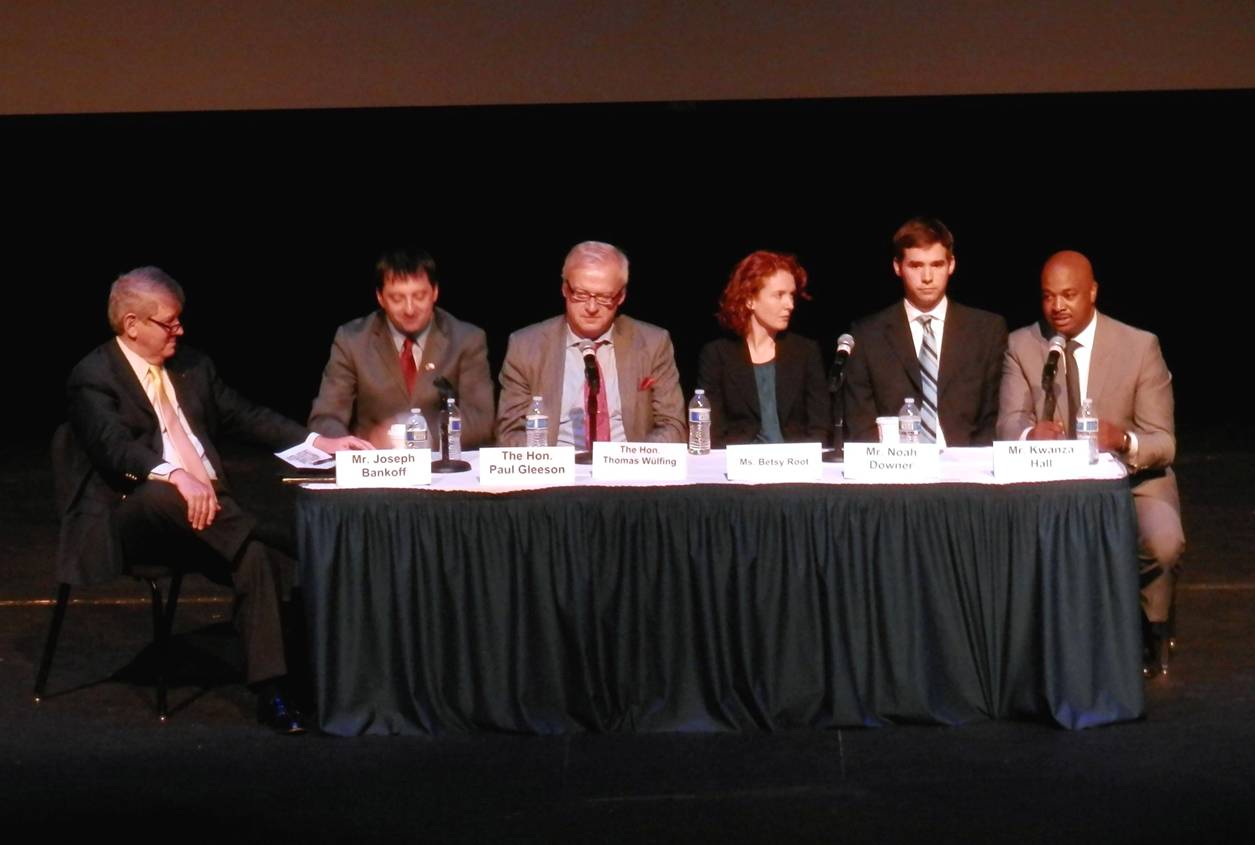
Photo: (left to right) Mr. Joseph Bankoff, Consul General Paul Gleeson, Deputy Consul General Thomas Wülfing, Mrs. Betsy Root, Mr. Noah Downer, and Councilman Kwanza Hall discuss how students can get involved in Atlanta’s international community at GTMUN XVI’s opening ceremonies. Image courtesy of the GTMUN Press Corps, press.gtmun.org.
GTMUN Secretary General Andrew Wirt, an INTA major, raised awareness of the GTMUN conference among the Atlanta Consular Corps, Atlanta City Hall, and the Metro Atlanta Chamber of Commerce. Those efforts culminated in a conference centerpiece, the panel discussion “Atlanta as an International City,” which included participants from the consular offices of Ireland and Germany, the U.S. Fund for UNICEF, the Mayor’s Office of International Affairs, and the Atlanta City Council.
Director General Jacob Whitfield, also an INTA major, mobilized a staff of fifty-one volunteer Georgia Tech students to synthesize over four-hundred fifty pages of research guides for conference participants. This required working through thousands of academic references. With the help of Mary Axford at the Georgia Tech Library, the team developed a multimedia conference preparation tool, the GTMUN Library Resource Guide.
This year’s student staff also undertook the most extensive rebranding campaign in the history of GTMUN. Creative use of social media including meme-based “Delegate Tips,” increased the GTMUN Facebook and Twitter following by 188% and 343%, respectively. A re-styling of conference preparation materials, brochures, and registration packets by Undersecretary General Lubna Zubair, (Aeronautical Engineering) resulted in a 14% increase from last year’s conference attendance.
The staff also reinforced the conference’s reputation for technological prowess. Assistant Director Tanuj Maheshwari (Aeronautical Engineering) worked with Conference Director Rohan Aggarwal (Industrial Engineering) and Crisis Director Indrajit Viswanath (Industrial Engineering) to program an awards algorithm in Java, making the GTMUN awards process unbiased and speedy.
Feedback from high schoolers leaving the Ferst Center after the opening ceremony indicated that they were inspired to get involved-- and stay involved-- as citizens of a world that extends well beyond Tuesday.
|

|
Volunteers Live the Georgia Tech Motto of "Progress and Service"
Danielle Sharpe, an undergraduate student in the School of History, Technology, and Society is passionate about her city and community. SHarpe volunteers with the Atlanta Harm Reduction Coalition, a partner of the Westside Communities Alliance (WCA) led by Ivan Allen College. She reflected on the opportunity to volunteer for the 23rd Annual Hands On Atlanta Day that was held on October 5.
Last Saturday, a group of Georgia Tech students and I journeyed over to the Bellwood Boys and Girls Club to volunteer at the opening event for Hands On Atlanta Day. Student volunteers represented multiple organizations, including the Ivan Allen College of Liberal Arts, Black Graduate Student Association, WCA, and Circle K. We all worked hand in hand to give more life to an already vibrant boys and girls club.
Many of the projects reminded us of our carefree days as elementary students, which was long before we all accepted the challenge to become Georgia Tech students. From painting murals and cornhole platforms to revamping the playground areas and building reading lofts, volunteering at the Bellwood Boys and Girls Club was very much like a morning full of arts and crafts. We even got to decorate birdhouses!
Beyond being able to show our creative prowess, we got a chance to develop a deeper understanding of our service. The volunteer event was organized and funded primarily by Ivan Allen IV (pictured above), grandson of former Atlanta Mayor Ivan Allen, Jr. The namesake of the Ivan Allen College of Liberal Arts, Mayor Allen left a legacy of social courage for racial progression in a major southern city. Seeing Ivan IV live his grandfather’s visions was very moving, and it was even more special knowing that we were a part of his grandfather’s vision too.
We are very appreciative of Ivan Allen IV, the Ivan Allen College, WCA, The Salvation Army Boys & Girls Clubs of Greater Atlanta, and Hands On Atlanta for organizing such an enjoyable and insightful event. I think it is wonderful and necessary that the Ivan Allen College and WCA are taking the initiative to serve our neighbors, communities in the Westside. This volunteering event allowed my peers and me to see that it is important to give back to our communities, especially those to which we are historically linked. If you want to walk, live, and breathe the Georgia Tech motto of “Progress and Service,” you’re at Georgia Tech. You can do that!
Pictured above (L to R): Mackenzie Madden, assistant coordinator for Westside Communities Alliance; Charlie Smith, senior unit director for The Salvation Army Bellwood Boys and Girls Club; Major Todd Hawks, Metropolitan Atlanta Area Commander for The Salvation Army; Ivan Allen, IV, director of Business Development for Staples, Inc.; Sheri Davis-Faulkner, Community Liaison for Westside Communities Alliance
|

|
This is GT Liberal Arts: Students Blog about Life in IAC
This semester, I have finally taken full advantage of the absolute unbeatable location that Georgia Tech offers!
Whether attending Falcons games just down the street at the Georgia Dome, seeing concerts around the corner at the Tabernacle, or experiencing some of the finest restaurants in the nation on Ponce, being in Atlanta is an added benefit to attending one of the greatest schools with some of the greatest people and greatest professors in the world. Above all, though, my favorite activity to do outside of class is to go running at Piedmont Park. While training for an upcoming half marathon, I will often run the mere 1.6 miles from North Avenue to Piedmont and explore the endless trails surrounded by skyscrapers there. The weather this past week has been absolutely beautiful and the fall colors at the Park were too good to not Instagram! Posted by Jillian Broaddus, STaC, Classes at Tech
Follow IAC undergraduate life or the freshmen survival guide. It's all on tumblr iamliberalrtsgt.
|
|











 t of photovoltaic technology and demonstrated its feasibility as an energy source. Today, the government is encouraging the creation of large-scale solar farms and geothermal energy. In 2012, the Japanese government lifted its decades-old ban to allow geothermal projects in national parks and monuments and earmarked $67 million for a program to aid geothermal power developers through capital injections and debt guarantees. By 2030, the Japanese government aims to triple renewable energy sources, which today make up about 10 percent of the country’s power supply.
t of photovoltaic technology and demonstrated its feasibility as an energy source. Today, the government is encouraging the creation of large-scale solar farms and geothermal energy. In 2012, the Japanese government lifted its decades-old ban to allow geothermal projects in national parks and monuments and earmarked $67 million for a program to aid geothermal power developers through capital injections and debt guarantees. By 2030, the Japanese government aims to triple renewable energy sources, which today make up about 10 percent of the country’s power supply. Although smart grid policies vary across the United States, Brown and Zhou found that most states have implemented interconnection standards and net metering policies, although constraining limits also exist in some states. Net metering allows customers to connect the power they generate to utility grids to offset their electricity consumption and sell excess generation to the utility.
Although smart grid policies vary across the United States, Brown and Zhou found that most states have implemented interconnection standards and net metering policies, although constraining limits also exist in some states. Net metering allows customers to connect the power they generate to utility grids to offset their electricity consumption and sell excess generation to the utility. portfolio standard is a mandate that retail electricity providers purchase a specified fraction of their electricity sales from renewable sources. By March 2013, 29 states, the District of Columbia, Puerto Rico, and the Northern Mariana Islands had passed mandatory renewable portfolio standards; and eight states, Guam, and the U.S. Virgin Islands had passed voluntary renewable portfolio standards.
portfolio standard is a mandate that retail electricity providers purchase a specified fraction of their electricity sales from renewable sources. By March 2013, 29 states, the District of Columbia, Puerto Rico, and the Northern Mariana Islands had passed mandatory renewable portfolio standards; and eight states, Guam, and the U.S. Virgin Islands had passed voluntary renewable portfolio standards.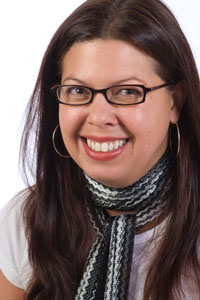






 John Wooden was celebrated not only as a fantastically successful coach, but as a fellow who stood for tradition and order. Was that a legitimate reading of John Wooden?
John Wooden was celebrated not only as a fantastically successful coach, but as a fellow who stood for tradition and order. Was that a legitimate reading of John Wooden?





